pub struct Type(/* private fields */);Expand description
The type of easing curve.
C++ enum: QEasingCurve::Type.
The type of easing curve.
See also addCubicBezierSegment() and addTCBSegment().
Implementations§
Source§impl Type
impl Type
Sourcepub const Linear: Type
pub const Linear: Type
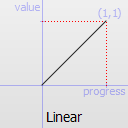
Easing curve for a linear (t) function: velocity is constant.
(C++ enum variant: ```Linear = 0```)Sourcepub const InQuad: Type
pub const InQuad: Type
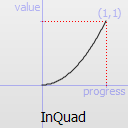
Easing curve for a quadratic (t^2) function: accelerating from zero velocity.
(C++ enum variant: ```InQuad = 1```)Sourcepub const OutQuad: Type
pub const OutQuad: Type
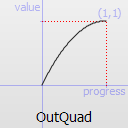
Easing curve for a quadratic (t^2) function: decelerating to zero velocity.
(C++ enum variant: ```OutQuad = 2```)Sourcepub const InOutQuad: Type
pub const InOutQuad: Type
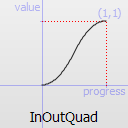
Easing curve for a quadratic (t^2) function: acceleration until halfway, then deceleration.
(C++ enum variant: ```InOutQuad = 3```)Sourcepub const OutInQuad: Type
pub const OutInQuad: Type
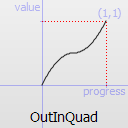
Easing curve for a quadratic (t^2) function: deceleration until halfway, then acceleration.
(C++ enum variant: ```OutInQuad = 4```)Sourcepub const InCubic: Type
pub const InCubic: Type
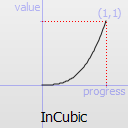
Easing curve for a cubic (t^3) function: accelerating from zero velocity.
(C++ enum variant: ```InCubic = 5```)Sourcepub const OutCubic: Type
pub const OutCubic: Type
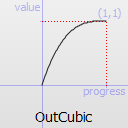
Easing curve for a cubic (t^3) function: decelerating to zero velocity.
(C++ enum variant: ```OutCubic = 6```)Sourcepub const InOutCubic: Type
pub const InOutCubic: Type
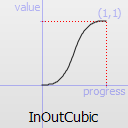
Easing curve for a cubic (t^3) function: acceleration until halfway, then deceleration.
(C++ enum variant: ```InOutCubic = 7```)Sourcepub const OutInCubic: Type
pub const OutInCubic: Type
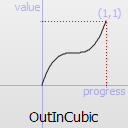
Easing curve for a cubic (t^3) function: deceleration until halfway, then acceleration.
(C++ enum variant: ```OutInCubic = 8```)Sourcepub const InQuart: Type
pub const InQuart: Type
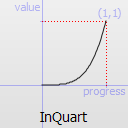
Easing curve for a quartic (t^4) function: accelerating from zero velocity.
(C++ enum variant: ```InQuart = 9```)Sourcepub const OutQuart: Type
pub const OutQuart: Type
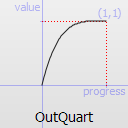
Easing curve for a quartic (t^4) function: decelerating to zero velocity.
(C++ enum variant: ```OutQuart = 10```)Sourcepub const InOutQuart: Type
pub const InOutQuart: Type
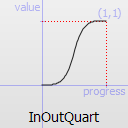
Easing curve for a quartic (t^4) function: acceleration until halfway, then deceleration.
(C++ enum variant: ```InOutQuart = 11```)Sourcepub const OutInQuart: Type
pub const OutInQuart: Type
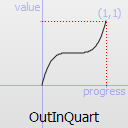
Easing curve for a quartic (t^4) function: deceleration until halfway, then acceleration.
(C++ enum variant: ```OutInQuart = 12```)Sourcepub const InQuint: Type
pub const InQuint: Type
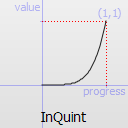
Easing curve for a quintic (t^5) easing in: accelerating from zero velocity.
(C++ enum variant: ```InQuint = 13```)Sourcepub const OutQuint: Type
pub const OutQuint: Type
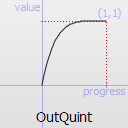
Easing curve for a quintic (t^5) function: decelerating to zero velocity.
(C++ enum variant: ```OutQuint = 14```)Sourcepub const InOutQuint: Type
pub const InOutQuint: Type
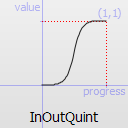
Easing curve for a quintic (t^5) function: acceleration until halfway, then deceleration.
(C++ enum variant: ```InOutQuint = 15```)Sourcepub const OutInQuint: Type
pub const OutInQuint: Type
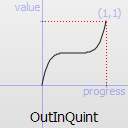
Easing curve for a quintic (t^5) function: deceleration until halfway, then acceleration.
(C++ enum variant: ```OutInQuint = 16```)Sourcepub const InSine: Type
pub const InSine: Type
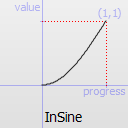
Easing curve for a sinusoidal (sin(t)) function: accelerating from zero velocity.
(C++ enum variant: ```InSine = 17```)Sourcepub const OutSine: Type
pub const OutSine: Type
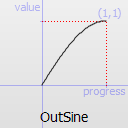
Easing curve for a sinusoidal (sin(t)) function: decelerating to zero velocity.
(C++ enum variant: ```OutSine = 18```)Sourcepub const InOutSine: Type
pub const InOutSine: Type
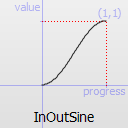
Easing curve for a sinusoidal (sin(t)) function: acceleration until halfway, then deceleration.
(C++ enum variant: ```InOutSine = 19```)Sourcepub const OutInSine: Type
pub const OutInSine: Type
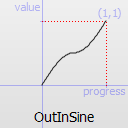
Easing curve for a sinusoidal (sin(t)) function: deceleration until halfway, then acceleration.
(C++ enum variant: ```OutInSine = 20```)Sourcepub const InExpo: Type
pub const InExpo: Type
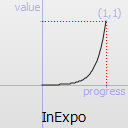
Easing curve for an exponential (2^t) function: accelerating from zero velocity.
(C++ enum variant: ```InExpo = 21```)Sourcepub const OutExpo: Type
pub const OutExpo: Type
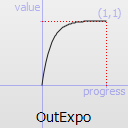
Easing curve for an exponential (2^t) function: decelerating to zero velocity.
(C++ enum variant: ```OutExpo = 22```)Sourcepub const InOutExpo: Type
pub const InOutExpo: Type
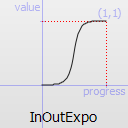
Easing curve for an exponential (2^t) function: acceleration until halfway, then deceleration.
(C++ enum variant: ```InOutExpo = 23```)Sourcepub const OutInExpo: Type
pub const OutInExpo: Type
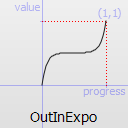
Easing curve for an exponential (2^t) function: deceleration until halfway, then acceleration.
(C++ enum variant: ```OutInExpo = 24```)Sourcepub const InCirc: Type
pub const InCirc: Type
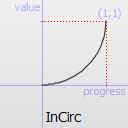
Easing curve for a circular (sqrt(1-t^2)) function: accelerating from zero velocity.
(C++ enum variant: ```InCirc = 25```)Sourcepub const OutCirc: Type
pub const OutCirc: Type
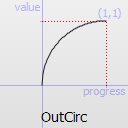
Easing curve for a circular (sqrt(1-t^2)) function: decelerating to zero velocity.
(C++ enum variant: ```OutCirc = 26```)Sourcepub const InOutCirc: Type
pub const InOutCirc: Type
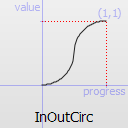
Easing curve for a circular (sqrt(1-t^2)) function: acceleration until halfway, then deceleration.
(C++ enum variant: ```InOutCirc = 27```)Sourcepub const OutInCirc: Type
pub const OutInCirc: Type
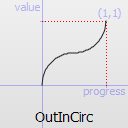
Easing curve for a circular (sqrt(1-t^2)) function: deceleration until halfway, then acceleration.
(C++ enum variant: ```OutInCirc = 28```)Sourcepub const InElastic: Type
pub const InElastic: Type
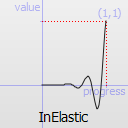
Easing curve for an elastic (exponentially decaying sine wave) function: accelerating from zero velocity. The peak amplitude can be set with the amplitude parameter, and the period of decay by the period parameter.
(C++ enum variant: ```InElastic = 29```)Sourcepub const OutElastic: Type
pub const OutElastic: Type
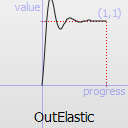
Easing curve for an elastic (exponentially decaying sine wave) function: decelerating to zero velocity. The peak amplitude can be set with the amplitude parameter, and the period of decay by the period parameter.
(C++ enum variant: ```OutElastic = 30```)Sourcepub const InOutElastic: Type
pub const InOutElastic: Type
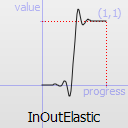
Easing curve for an elastic (exponentially decaying sine wave) function: acceleration until halfway, then deceleration.
(C++ enum variant: ```InOutElastic = 31```)Sourcepub const OutInElastic: Type
pub const OutInElastic: Type
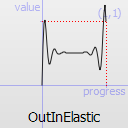
Easing curve for an elastic (exponentially decaying sine wave) function: deceleration until halfway, then acceleration.
(C++ enum variant: ```OutInElastic = 32```)Sourcepub const InBack: Type
pub const InBack: Type
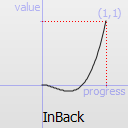
Easing curve for a back (overshooting cubic function: (s+1)*t^3 - s*t^2) easing in: accelerating from zero velocity.
(C++ enum variant: ```InBack = 33```)Sourcepub const OutBack: Type
pub const OutBack: Type
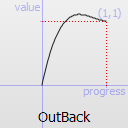
Easing curve for a back (overshooting cubic function: (s+1)*t^3 - s*t^2) easing out: decelerating to zero velocity.
(C++ enum variant: ```OutBack = 34```)Sourcepub const InOutBack: Type
pub const InOutBack: Type
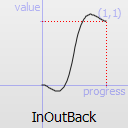
Easing curve for a back (overshooting cubic function: (s+1)*t^3 - s*t^2) easing in/out: acceleration until halfway, then deceleration.
(C++ enum variant: ```InOutBack = 35```)Sourcepub const OutInBack: Type
pub const OutInBack: Type
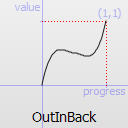
Easing curve for a back (overshooting cubic easing: (s+1)*t^3 - s*t^2) easing out/in: deceleration until halfway, then acceleration.
(C++ enum variant: ```OutInBack = 36```)Sourcepub const InBounce: Type
pub const InBounce: Type
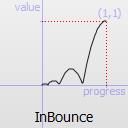
Easing curve for a bounce (exponentially decaying parabolic bounce) function: accelerating from zero velocity.
(C++ enum variant: ```InBounce = 37```)Sourcepub const OutBounce: Type
pub const OutBounce: Type
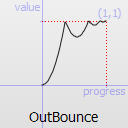
Easing curve for a bounce (exponentially decaying parabolic bounce) function: decelerating from zero velocity.
(C++ enum variant: ```OutBounce = 38```)Sourcepub const InOutBounce: Type
pub const InOutBounce: Type
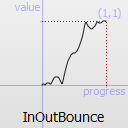
Easing curve for a bounce (exponentially decaying parabolic bounce) function easing in/out: acceleration until halfway, then deceleration.
(C++ enum variant: ```InOutBounce = 39```)Sourcepub const OutInBounce: Type
pub const OutInBounce: Type
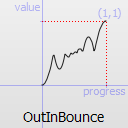
Easing curve for a bounce (exponentially decaying parabolic bounce) function easing out/in: deceleration until halfway, then acceleration.
(C++ enum variant: ```OutInBounce = 40```)Sourcepub const CosineCurve: Type
pub const CosineCurve: Type
C++ enum variant: CosineCurve = 44
Sourcepub const BezierSpline: Type
pub const BezierSpline: Type
Allows defining a custom easing curve using a cubic bezier spline (C++ enum variant: BezierSpline = 45)
Sourcepub const TCBSpline: Type
pub const TCBSpline: Type
Allows defining a custom easing curve using a TCB spline (C++ enum variant: TCBSpline = 46)
Sourcepub const Custom: Type
pub const Custom: Type
This is returned if the user specified a custom curve type with setCustomType(). Note that you cannot call setType() with this value, but type() can return it. (C++ enum variant: Custom = 47)
Sourcepub const NCurveTypes: Type
pub const NCurveTypes: Type
C++ enum variant: NCurveTypes = 48